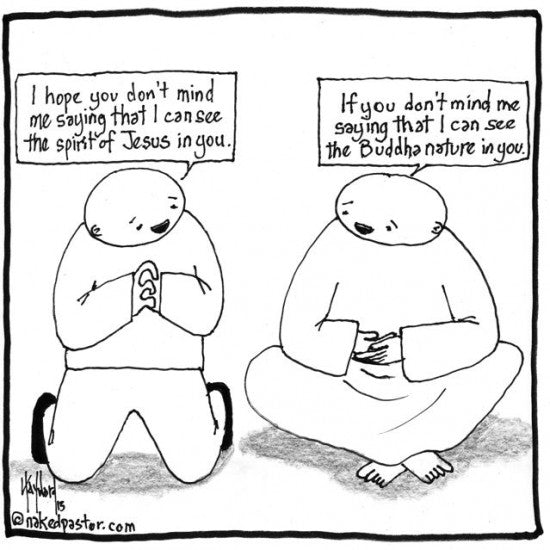We believe what we want to believe. We see what we want to see. I remember when I first considered, as a Christian, the value of Buddhism. I read up on it. Studied it. Practiced some of it. At first I conceded that a Christian could incorporate some Buddhism. I could concede that there were good Christ-like Buddhists out there. I could even concede that many of the teachings of the Buddha and Jesus were strikingly similar. Once I lived with this for a while, then I could move on to realize that there were strikingly different ideas presented in Christianity and Buddhism. Even their concepts of history and time are impossibly irreconcilable. So I moved from we are different to we are similar to we are very different. Philosophically. Theologically. Etcetera. It was when I had my waterfall dream and started trying to articulate the z-theory that I realized our unity with all others is not found ideologically. I discovered that at a very deep and fundamental level we are essentially one. Our ideologies are our own perspectives and articulations of the same. There is one event. There are billions of experiences and expressions. So I moved from we are different to we are similar to we are very different to we are one. I am passionate about providing a safe and supportive place for people to transition spiritually.

the spirit of Jesus and the Buddha nature
2 minute read
EACH WEEK, 14,000+ PEOPLE READ MY NEWSLETTER.
It's a weekly email about deconstruction, freedom, and life in general.

2 comments
People often ask; “Where does God come from?” I discern spiritually that the answer must be this. “Out of Oneness; out of Singularity.” Interestingly enough, once we stop meditating on the numinous phenomenon of oneness or singularity, we unconsciously resort to duality, in which the image of God emerges, not alas, any longer in singularity, but indubitably conjoined with human thought, human words, human deeds. We cannot conceive of God without the aid of our intellect. The intellect, therefore, must sacrifice itself during moments of solace in order for the numinous singularity, which is, God revealed, to be made manifest.
Karl C. Folkes
People often ask; “Where does God come from?” I discern spiritually that the answer must be this. “Out of Oneness; out of Singularity.” Interestingly enough, once we stop meditating on the numinous phenomenon of oneness or singularity, we unconsciously resort to duality, in which the image of God emerges, not alas, any longer in singularity, but indubitably conjoined with human thought, human words, human deeds. We cannot conceive of God without the aid of our intellect. The intellect, therefore, must sacrifice itself during moments of solace in order for the numinous singularity, which is, God revealed, to be made manifest.
Karl C. Folkes